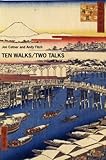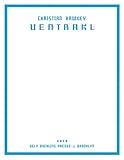Forget about the “great” American novel that conveniently doubles this gifting season as a subway-reading weight set. This year I fell for books that were pithy and petite, their massive mental power nearly disguised by their thin widths. They shared a splendor that radiates from intelligent understatement, and left this reader contented with curious desire. Fitting, then, that the title of year’s BEST goes to not one but a series of slim volumes dedicated to a shared “investigative impulse”–the Dossier Series at Ugly Duckling Presse, or at least the following four books from the series that I read this year.
1. I first stumbled upon the brilliant Vanessa Place and Robert Fitterman’s Notes on Conceptualisms late last year. Its heavy-hitting 76 pages contain an aphoristic outline that reads almost like a list of theorems that attempt to define conceptual writing. With a nod to conceptual art, conceptual writing considers words first and foremost as material objects. With references to Benjamin, Gödel, and Zizek and a multitude of examples for further exploration of Flarf, Appropriation, and Constraint, the book radiates ideas, and demands rereading.
 2. Inspired by Eileen Myles’s essay “Everyday Barf,” Dodie Bellamy’s Barf Manifesto in turn has already inspired a third generation of manifestos, as if Myles’s essay set off a great chain of serial barfing. Using Myles’s essay as a model, Bellamy breaks from the traditional essay by mixing, or rather disgorging, the personal alongside the analytical, purging disparate yet loosely connected ideas, images, and emotions onto the page. Thus the concept of “Barf” is born. Quoting Bellamy: “The Barf is messy, irregular, but you can feel in your guts that it’s going somewhere, you can’t stop it, can’t shape it, you’ve just got to let it run its course.”
2. Inspired by Eileen Myles’s essay “Everyday Barf,” Dodie Bellamy’s Barf Manifesto in turn has already inspired a third generation of manifestos, as if Myles’s essay set off a great chain of serial barfing. Using Myles’s essay as a model, Bellamy breaks from the traditional essay by mixing, or rather disgorging, the personal alongside the analytical, purging disparate yet loosely connected ideas, images, and emotions onto the page. Thus the concept of “Barf” is born. Quoting Bellamy: “The Barf is messy, irregular, but you can feel in your guts that it’s going somewhere, you can’t stop it, can’t shape it, you’ve just got to let it run its course.”
 3. On sixty consecutive mornings, Andy Fitch took walks through Manhattan’s parks and streets, and wrote sixty sixty-sentence accounts of his observations. His Manhattan is electrified and nuanced, he sees with a clarity and presence that made this reader realize how much life she overlooks in the everyday. Ten Walks/Two Talks pairs selections from Fitch’s walks with two conversations between Fitch and dialogic partner Jon Cotner. While sitting in an unnamed grocery store cafeteria in Manhattan, ostensibly eating stolen food, the pair casually bounce from Diogenes to Emerson and Wittgenstein, to integrating their surroundings like a “testosterone charged” pack of men or the girl with very red cheeks sitting nearby, to friendly digressions like recalling lewd gestures they’ve made at car drivers who’ve nearly run them over on city streets.
3. On sixty consecutive mornings, Andy Fitch took walks through Manhattan’s parks and streets, and wrote sixty sixty-sentence accounts of his observations. His Manhattan is electrified and nuanced, he sees with a clarity and presence that made this reader realize how much life she overlooks in the everyday. Ten Walks/Two Talks pairs selections from Fitch’s walks with two conversations between Fitch and dialogic partner Jon Cotner. While sitting in an unnamed grocery store cafeteria in Manhattan, ostensibly eating stolen food, the pair casually bounce from Diogenes to Emerson and Wittgenstein, to integrating their surroundings like a “testosterone charged” pack of men or the girl with very red cheeks sitting nearby, to friendly digressions like recalling lewd gestures they’ve made at car drivers who’ve nearly run them over on city streets.
 4. Christian Hawkey’s Ventrakl explores ideas of authorship and collaboration through the act of translation. Hawkey didn’t know German when he began translating Georg Trakl’s poems, and so he integrated creative techniques like using using an online translation program, shooting the text with a 12 gauge and translating the perforated page, and leaving pages exposed to the elements for a year before translating what remained. In doing so, Hawkey physically represents (and augments) the inherent degradation of the original text that occurs in translation. Ventrakl is as much a book of poetry as it is a meditation on how the identities of the author and translator merge. The result is haunting and beautiful.
4. Christian Hawkey’s Ventrakl explores ideas of authorship and collaboration through the act of translation. Hawkey didn’t know German when he began translating Georg Trakl’s poems, and so he integrated creative techniques like using using an online translation program, shooting the text with a 12 gauge and translating the perforated page, and leaving pages exposed to the elements for a year before translating what remained. In doing so, Hawkey physically represents (and augments) the inherent degradation of the original text that occurs in translation. Ventrakl is as much a book of poetry as it is a meditation on how the identities of the author and translator merge. The result is haunting and beautiful.
More from a Year in Reading 2010
Don’t miss: A Year in Reading 2009, 2008, 2007, 2006, 2005
The good stuff: The Millions’ Notable articles
The motherlode: The Millions’ Books and Reviews
Like what you see? Learn about 5 insanely easy ways to Support The Millions









